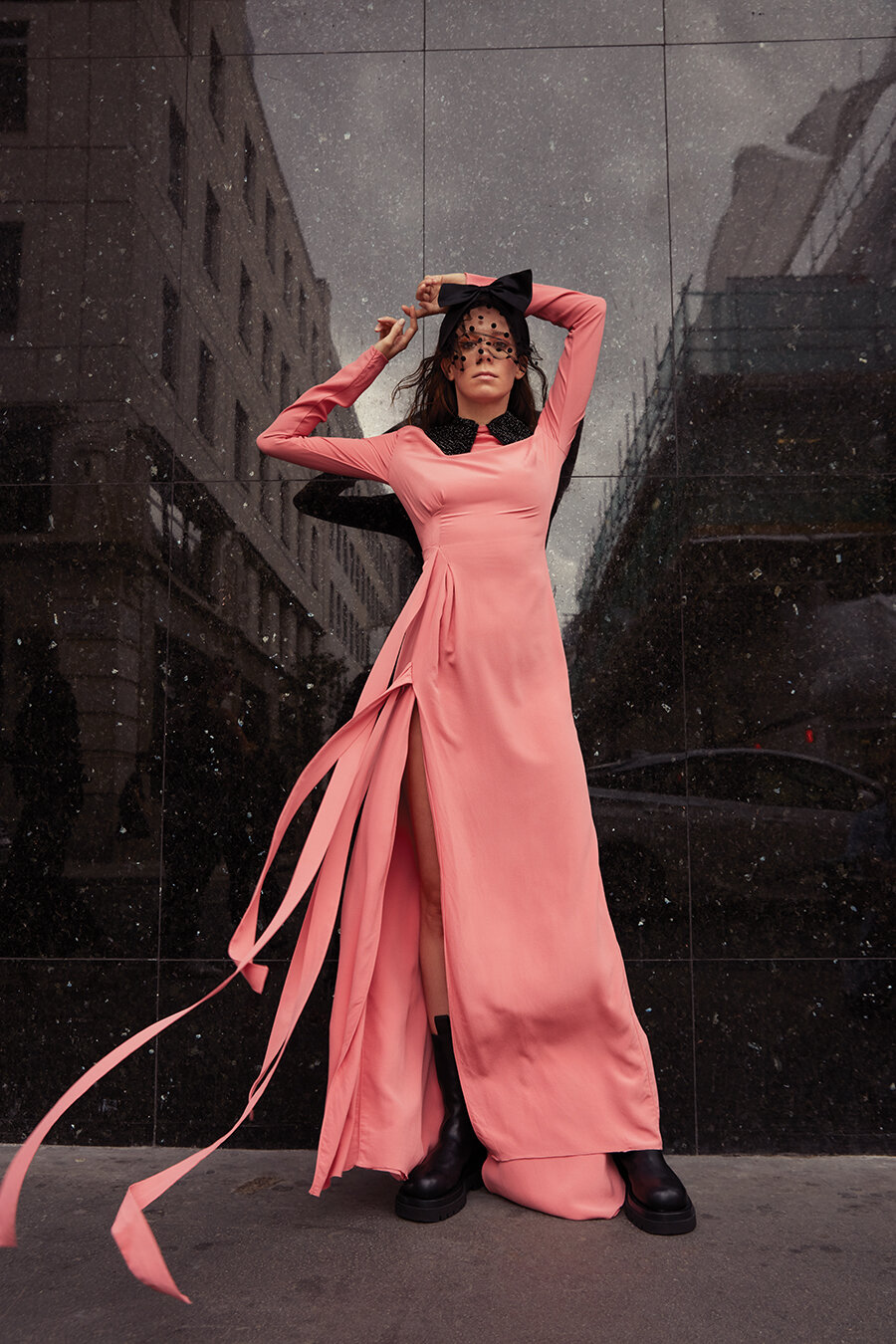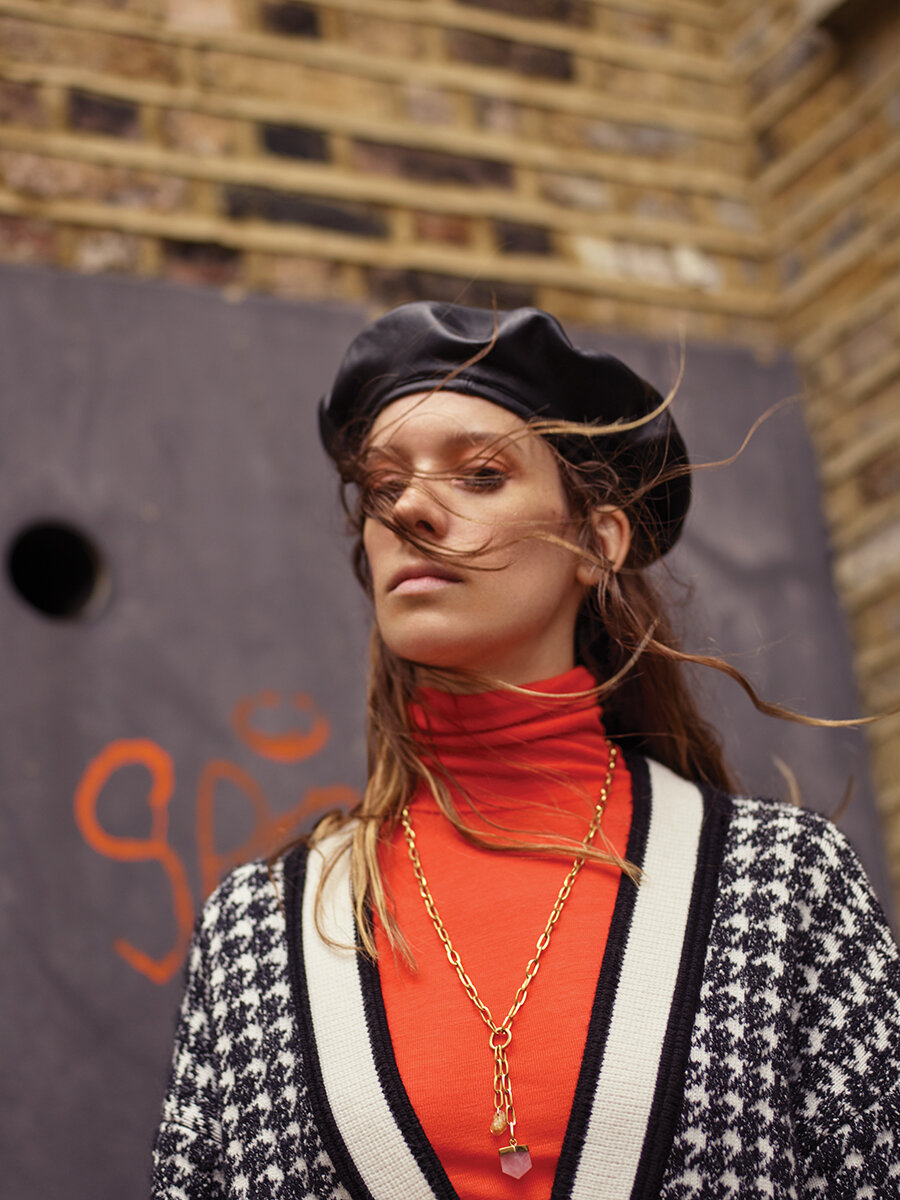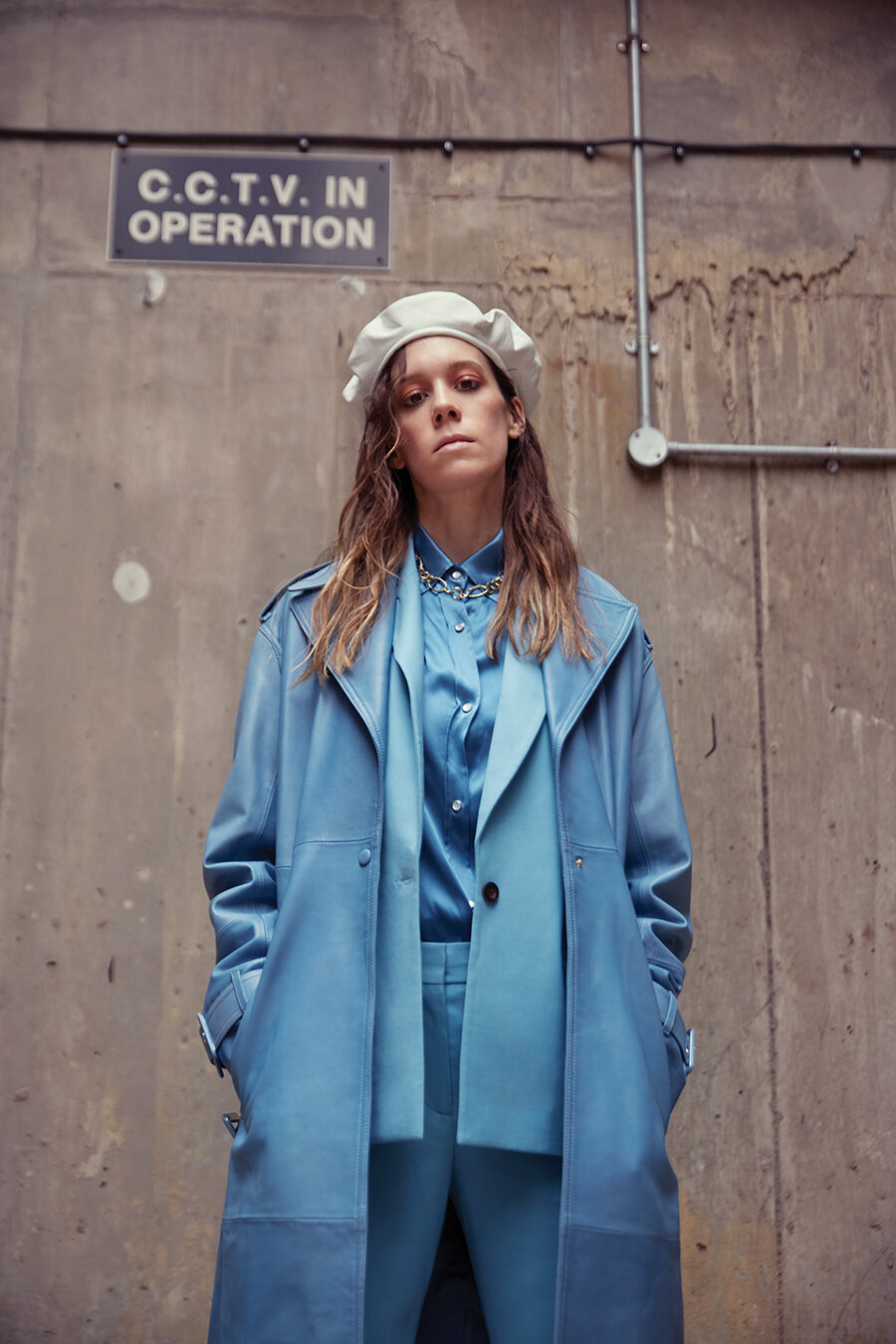The Wylde Interview: Chloe Pirrie
HIGHLY VISIBLE
FROM EDINBURGH TO HOLLYWOOD – VIA BYRON BURGERS – ACTRESS CHLOE PIRRIE’S TRAJECTORY IS GATHERING MOMENTUM. HER FIRST MOVIE PUT HER ON EVERY LIST OF STARS-TO-WATCH, AND NOW SHE ADDS WYLDE FASHION MODEL TO HER GROWING LIST OF ROLES, SHE TELLS DAVID NEWTON ABOUT SCREEN vs STAGE… AND A LAMB CALLED MERYL!
Photography by Nici + Karin
Dress: Ermanno Scervino. Boots: Bottega Veneta. Headdress: Emily-London
Idly scrolling through the TV schedules a couple of Christmasses ago, I caught the beginning of Midas-touched writer/director Sally Wainwright’s feature-length drama To Walk Invisible, about the Brontë sisters.
No cosy Sunday-night bonnet-fest, it painted a grim, mud-soaked picture of the harsh realities behind the tentative beginnings of these three literary geniuses, and in a consistently strong production, one performance, for me, shone out like an angry, fiery beacon. Chloe Pirrie’s portrayal of Emily Brontë – fierce, passionate and highly moral – dispelled any Kate Bush-induced visions of an ethereal dreamer and made me immediately turn to IMDb to check out this stunning actress. Despite the perfect broad Yorkshire accent in To Walk.., she’s from Edinburgh, and broke out with her role in indie flick Shell (2012), a Scotland-set drama that got the industry buzzing, to the extent that Pirrie’s mantelpiece soon became laden with ones-to-watch awards. Something told us this adventurous actress wouldn’t mind a bit of fashion modelling – followed by an interview – so we snapped her in some gorgeous garments in the streets near Wylde HQ and sat down for a chinwag…
Dress and coat: Valentino. Bag: Marni. Earrings: Alighieri. Glasses: Linda Farrow
Wylde: Did you enjoy the shoot?
Claire Pirrie: Oh, it was so much fun, and what an amazing team of photographers; I’ve never been shot by two people at the same time before.I do enjoy it, especially the movement aspect and the body language of what you can convey, and the way you interact with the camera. When you’re filming, as an actress, you also have a relationship with the camera. It’s a slightly different one, but I do really enjoy that conversation.
I was told by one of the photographers that nothing fazed you, and you were completely focused…
Yes, I get very focused! It’s always very helpful when there are photographers who I really respond to. I really defer to direction from them because I’m not a model and it’s not my realm, so I very much want to listen to what they say, because they know what they want and need.
[Actress] Lily Newmark is in the TV series Temple with you, and I know her as a model; she was in Wylde a few issues ago. She’s done the opposite to you: model turned actress. How do you think that works?
I have another friend who did modelling before acting, and I think the two worlds are close. I imagine really good models are able to convey a story and respond imaginatively. They do a bit more than just standing there and looking in different directions. Also, because models are so used to dealing with cameras, they’re not scared of them, whereas I think, when a lot of actors start out, they haven’t done an awful lot of screen work. A camera’s a big thing; it’s like a weird alien beast in the room. As a model, it doesn’t faze you, and you’re used to being in a relationship with it, and staring down the lens.
Cardigan: Claudie Pierlot / Rollneck: Arket / Beret: Emily-London / Necklace: Cornelia Webb
Do you get taught that at drama school? Do they point cameras at you?
No. I don’t know about what it’s like now, but when I trained – I left Guildhall [School of Music and Drama] in 2009 – we did do a little bit of camera work, but it was a bit low-level. Without being mean, it was someone who had directed a few episodes of Casualty in 1992 or something! And you’re working with not-all-that-great scripts. We were more about classical theatre training. I imagine now all the drama schools do a little bit more camera-related training, because actors have to self-tape constantly. We’re always having to make our own mini films as audition tapes, so you have to really know what you’re doing. I left drama school and the first thing I did was a short film [Solstice] for the NFTS [National Film and Television School]. It was shot on film and I learned everything about acting on film on that, really. I was very lucky.
Surely, learning your craft while you’re in front of a camera is a minefield?
It is a minefield, but, to be honest, I think I am better on screen than I am on stage. The director of that short film looked at me after I’d done a scene and went: “Yes, film’s for you! You have this natural ability with this medium; the way your face is, and the way you respond.” And I suddenly felt really at home with the camera and that way of working, because there’s a kind of smallness in screen work, and a detail, that felt really natural to me. With theatre, I can get there, but it’s a much longer process, and I struggle to remove a sense of unease. I think that’s because at drama school all I’d done was theatre and I only realised, once I’d worked on screen, that I can do it, but it’s not quite the right fit.
Dress: Andrew GN / Gloves: Esaú Yori / Bag: DLYP / Earring: Cornelia Webb
Can you watch yourself back, on film?
I can, actually. I don’t find it easy to watch myself back, but I don’t mind it. I think it’s helpful to watch yourself sometimes, but you have to be careful that you don’t over-critique yourself. There’s been a couple of times when I’ve seen something I’ve done and I’ve been like: “What are you doing there?!” But normally I’m kind of pleased with what I do; I can remove myself and try to see it from a more objective point of view. You can get into habits and I find that there’s an endless level of detail that I can uncover when I’m working on a scene. That time between “Turnover!” and “Action!” on a set is really wonderful, because there’s complete stillness and there’s a magic moment where you suddenly enter this other place, and you’re kind of in a relationship with the camera. You’re revealing… you’re taking your skin off in front of this lens and letting the camera see you. That’s the thing, I think, with screen work: it’s about letting the camera into your soul [laughing].
Some actors say they prefer working on stage because they can endlessly reinterpret their lines, whereas with filming you are recording and committing yourself to just one version…
I can see their point. I think, onstage, there is an element of control that you have; the audience is live, absorbing what you show them. However, within reason, I like surrendering that control. It can be frustrating when you’ve done a TV show and you see that they’ve used a take that you don’t think was the best one, but you can still see why they chose to do it. It sees the scene from a point of view that wasn’t yours. It can be frustrating when you feel that something isn’t quite as good as it could have been, or they’ve chosen a funny cut of something. However, I really enjoy the process of surrendering control, creatively, and giving all the different kinds of shades that they might want. The best creative processes that I’ve had – normally on small projects or on indie films – are when you feel that you and the director and the crew are all on the same page.
Dress and coat: Valentino. Bag: Marni. Earrings: Alighieri. Glasses: Linda Farrow
Are you ready for a Hollywood blockbuster? Sci-fi, maybe?
Yeah! I think the child in me would love to do something exciting. Some Alien or Blade Runner or any Ridley Scott-type thing; that kind of character-led stuff; the more imaginative franchises. Things that have something to say.
Tell me a little about entering the acting world…
I left school in Edinburgh when I was 17, because you leave a year earlier in Scotland. I did Highers [the Scottish equivalent to A-levels] in English, French, History and Humanities. I was academic, to some extent, and when I was growing up there was a sense that I’d just probably go to university, rather than drama school, which was considered rather risky.My school wasn’t terribly supportive of that.
Were your family supportive?
Yes, my parents were happy when I got in to drama school; to study at a place I wanted to go, because I think they both felt there’s no point in doing something if it’s making you miserable. I had to save up to do the auditions, because you have to pay to audition at all these drama schools. So I auditioned pretty much everywhere. I was working in Costa [the coffee-shop chain] in Edinburgh, initially, because I couldn’t afford to leave home yet.
When you went to London, was that the first time you’d been there?
No, because my mum is from Chingford in Essex and has family in North-East London, so I’d been into town with her sometimes when we’d been visiting them. So I had a sense of London, and I had such a romantic impression of it that I felt it was somewhere you could run away to, to follow your dreams and be anonymous and, like a lot of creatives, you want to just crack on with your own idea of what you want to do with your life. And I was like: “If I move to London I can just waitress until I get the right opportunity.” And that’s what I ended up doing.
Dress: Tory Burch / Necklace: Cornelia Webb
Where did you waitress?
Oh God, everywhere! I used to work at Caravan, in various pubs, a place called the Salmon and Compass on Chapel Market. I worked at Byron [burger chain]for a long time as well (which was less glamorous, but paid the bills). I mean, I worked very, very hard for a long time!
How much time elapsed between arriving in London and getting your first film role, would you say?
I went to drama school for three years and then my first proper film role was Shell, in 2011, about two years after I graduated. And in those two years I did a little bit of theatre and I was in an episode of Doctors – the obligatory thing! And kind of bits and bobs, nothing very exciting, but when I did Shell, that’s when things changed quite drastically.
Why was it so important? Sell Shell to me!
It’s hard to describe it in a way that makes you go: “Ooh, I can’t wait to watch it!” Shell is an independent movie and a really beautiful story, about a father and daughter who live, isolated, in the Highlands and run a petrol station together. He’s got epilepsy – among other issues, psychologically – and she is 17 and at a turning point in her life, growing up. And it’s about their relationship, their co-dependency and their isolation in that landscape. Also their relationship with the land they live on, and the people who pass through the petrol station. So it’s a small film, in some ways, but it’s beautifully shot and it was a lovely project.
And didn’t you start to win awards because of your role in it?
Yes, I won the Bafta Breakthrough Artist and the Bifa Best Newcomer awards. When I did Shell, I was still waitressing for a year afterwards. It wasn’t like: “Oh, she did that movie and off she went to Hollywood!” It was still hard after that. I did Black Mirror about a year later, so it was like baby steps – as well as some big leaps – and then I was able to stop waitressing.
Do you think being on these lists of Best Newcomer etc actually helps?
I think it helps superficially. It helps with your confidence. It’s nice to be acknowledged by those kind of lists, especially [Screen International’s] Stars of Tomorrow, which I was included on. There is a little bit of pitching that goes on from your agent, but it does feel like quite a genuine one, in that they really do care about trying to select the people who they think are ones to watch. You feel their enthusiasm about it. And these lists can help with your confidence, because ultimately we have to walk into rooms all the time and meet people, and in job interviews, confidence is a big factor. It’s a talking point as well, when you start a meeting, especially when you’re young and you’re not seasoned in that way. I wasn’t that confident, walking into rooms with people in them. I still struggle with that aspect of my job; the non-acting bit.
Suit and coat: Victoria Beckham / Shirt: Paul & Joe / Beret: Emily-London / Necklace: Cornelia Webb
Do you think it’ll get better?
What I have learned is that it’s not just about what you are bringing into the room; it’s also the room that you’re walking into, and some rooms are warmer than others! Sometimes you don’t know what you’ve just walked into. The casting director might have been having an argument with the director just before you go in. These are fraught processes that are created and you can walk into an atmosphere and be like: “Ooh, I feel like something’s going on here…” and often you are right. And you can’t take that personally on yourself.
Would you ever want to direct?
Not yet, really; it looks so stressful! If I did, I wouldprobably have a good grounding in it, having been an actor. In terms of communicating with the performers, I think I would be good. But I think I would struggle with communicating with all the other heads of department who want your attention when you’re a director. It’s a very specific skill set, and I have huge respect for it, but I don’t think I’m ready for that yet.
Who would you cast, in a fantasy world?
Oh, I’ve never thought about it! There are peopleI think are amazing and I’d love to see how they work. I love Samantha Morton. Vicky McClure is amazing. So is Hayley Squires. Now I’m trying to think of a boy [pausing]… Josh O’Connor.
Are you a girl’s girl? Or a boy’s girl?
Ummm, I think I’m both, in a way! I’m a people’s person! In a good way.
Are you a people-pleaser?
I think I used to be. I’m less so now.
Nici + Karin’s video of Chloe Pirrie shot exclusively for Wylde
Which older actors do you like?
Well, I worked with Jonathan Pryce in To Walk Invisible, and he was great.
I love that movie! Tell me what it meant to you…
I think I just instinctively understood what the character [Emily Brontë] was about. The way that Sally Wainwright had imagined her; it really felt that she had written something, and I just knew how to do it. I don’t have that experience often in auditions, but when I read that script I just knew that it was in me. I was terrified before the audition, because I knew I had all that knowledge within me, but I didn’t know if it was going to translate what she wanted. I think it did, because Sally said: “That’s it, exactly! You’re everything that I imagined of her.” It was a really lovely thing, because it felt like a really natural character to me, somehow, which is odd because I’m quite different to her.
In what way?
It’s difficult, because she’s in a different period to me, but I think I’m a little bit less blinkered and stubborn than Emily. I’m a little bit more able to see the other person’s point of view. I don’t think Emily had a lot of time for other people’s points of view! And I’m probably a little bit more socialised than her.
Finally, our favourite question: What strange dreams have you had recently?
I have a classic one for you! I had a dream the other week that I was pregnant and, for whatever reason, I was having doubts about whether I wanted to go through with the pregnancy. I went to be scanned, and the lady who scanned my belly said: “Well, I’m delighted to tell you, you are going to be the proud mother of a spring lamb, in a couple of weeks!” And I was basically pregnant with a baby sheep! And in the dream I was really happy about it because I felt I could take care of a baby sheep really well. I woke up in a panic; it was very visceral! I have no idea what the hell it was about.
What would you have called it?
Something like… Meryl!
Styling: Sophie Kenningham @ Frank Agency
Hair: Emma Small @ Stella Creative Artists
Make-up: Cristine Dupuys @ The London Style Agency
Fashion assistant: Lily Austin
All episodes of Temple are available on Sky and Now TV
Chloe also apears in Carnival Row, which is
available to watch now on Amazon Prime Video








